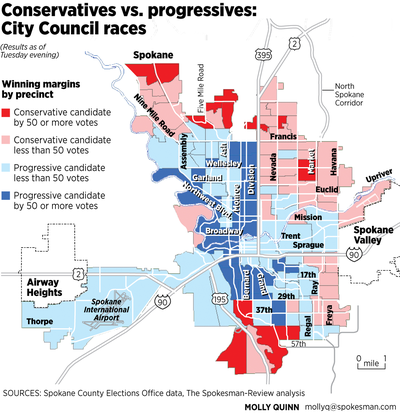Council races suggest conservative/progressive split in city

For more than a generation, Spokane city politics divided mainly on geographic lines. Tuesday’s election suggests those lines may be disappearing and new coalitions are redrawing the electoral maps.
Business-friendly, conservative, trending Republican voters once held sway south of the river or Interstate 90. Blue-collar, leaning Democrat voters had their strongholds north of those lines.
Those broad generalities held true in most municipal races, even though city offices are nominally nonpartisan. Sometimes, on ballot issues for big projects that needed tax support, there was a strong overlay of downtown business establishment versus neighborhood populists, but the north-south split stayed strong. When the general election for mayor was between two known Republicans, as it was in 1985, or two Democrats, as it was in 1989, the trends held.
There was also that odd constant in city politics: Mayors do not survive re-election, regardless of political leanings.
That went out the window Tuesday as David Condon, whose Republican credentials are so solid he once ran point for U.S. Rep. Cathy McMorris Rodgers, was re-elected mayor carrying all but a dozen of the city’s precincts. Because of a combination of retirements and defeats, a mayor hadn’t been elected to a second term since 1973.
Council President Ben Stuckart, a progressive Democrat who heads the veto-proof majority on the City Council, got a second term in a similar landslide, winning all but one precinct.
Easy victories by such different incumbents over weak opponents don’t reveal much. But the races in the three City Council districts probably do. They were closer, and generally matched a progressive against a conservative with a broad range of service on their electoral resumes.
Councilman Mike Fagan, who describes himself as a traditional conservative, has served a full term on the council and was a fixture in city politics before that. He was matched against Randy Ramos, a political newcomer endorsed by the Democratic Party.
Karen Stratton was also an incumbent, appointed last year to fill an empty seat. She has a political pedigree – her mother was a longtime legislator who represented some of the same areas in Council District 3. She faced another newcomer, Evan Verduin, who had Condon’s endorsement and campaign support in the mayor’s effort to end the veto-proof majority on the council.
The third seat, an open position in South Spokane’s District 2, featured LaVerne Biel, who had the support of conservatives and Condon, and Lori Kinnear, who has served as an aide to two progressives on the council.
Fagan, Stratton and Kinnear all won, and as of Wednesday’s tally, all had about 54 percent of the vote in their district.
When the votes for all city precincts are analyzed and compared with a few other ballot measures, an interesting pattern emerges. Conservative council candidates had the upper hand in Spokane’s Northwest neighborhoods around Whitworth and Indian Trail, and the upper South Hill from Comstock to the edges of the Moran Prairie. They also had a good handle on Hillyard and the areas around Francis and Division, although those are often light voting precincts where a dozen votes can tip the scales from one candidate to another.
Progressive candidates won many of the middle areas, including West Central, Logan Neighborhood and downtown, the strongholds in Browne’s Addition, Kendall Yards and the lower South Hill.
Comparing the council vote totals with several other items on the ballot tend to support the pattern. Initiative 1366, the latest plan to force the Legislature into approving tax increases with a supermajority, was denounced by many progressive groups and supported by many conservative groups. It passed easily countywide, but failed in a band of Spokane precincts north and south of I-90 that went for progressive council candidates.
City Proposition 1, the Worker Bill of Rights, an idea spawned by the progressive group Envision Spokane, failed overwhelmingly. The biggest margins against Prop 1 are in the heart of those districts that went for conservative council candidates. The few precincts that gave it slim margins of approval were some of those with the strongest margins for progressive council candidates.
One election doesn’t rewrite the campaign map, and it could be argued Fagan and Stratton owe their victories at least in part to the name familiarity incumbents enjoy. It’s likely more of a gradual evolution than a tectonic shift in Spokane politics. But it points out some patterns for political activists to consider as a much bigger election year approaches. Conservative candidates can find success in North Spokane precincts, which are not an automatic gimme for Democrats. Progressive candidates who have found success just south of I-90 can pick up votes even farther up the hill in areas once safe for Republicans.